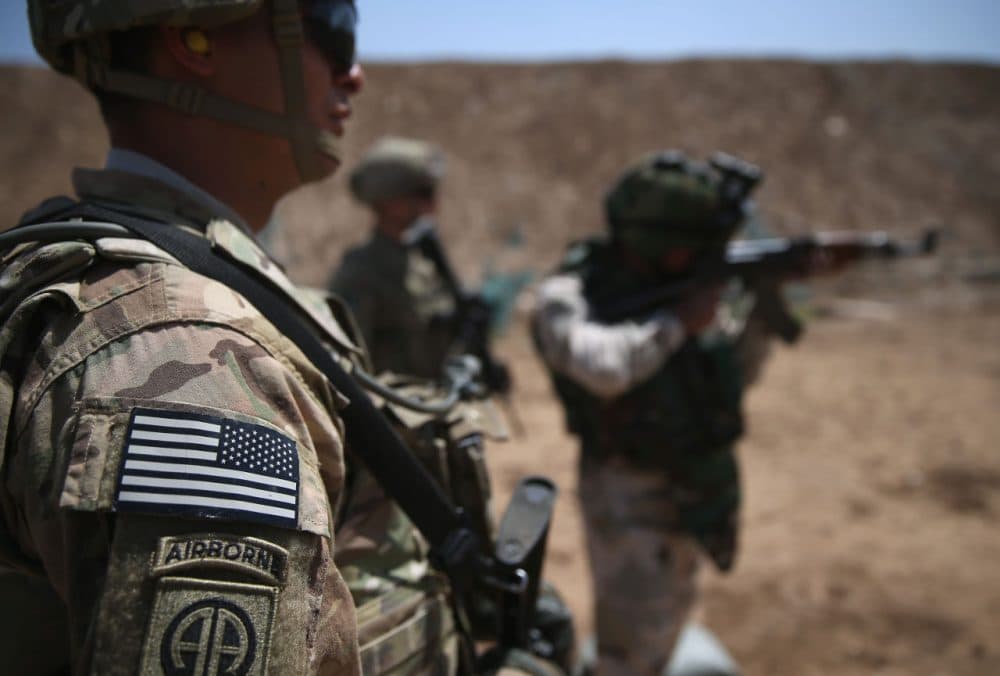Advertisement
How Should The U.S. Fight ISIS?
Resume
At a news conference in Germany yesterday, President Obama acknowledged that the U.S. lacks a "complete strategy" for training and equipping the Iraqi military to fight the Islamic militant group ISIS, which over the past year has taken over large swaths of Iraq and Syria.
How far should the U.S. go in fighting the group, in order to defeat it? Here & Now's Robin Young discusses this with two experts:
Shadi Hamid is a fellow in the Project on U.S. Relations with the Islamic World in the Center for Middle East Policy at the Brookings Institution, and retired Army officer Douglas Ollivant is a senior fellow in the Future of War project at New America Foundation, and a partner in Mantid International, which has business interests in southern Iraq.
Both analysts oppose putting U.S. boots on the ground.
Interview Highlights
Douglas Ollivant on the U.S. strategy in Iraq
"In the big picture, we do have a strategy... The U.S. strategy for Iraq is to help the Iraqis militarily, in terms of equipping, training, providing intelligence and providing air power. So we want to help them defeat ISIL, we need to help them keep Iraq together and optimally, we want to keep Iraq Western-oriented, rather than oriented on Iran."
Shadi Hamid on the problems with the U.S. plan
"I think many of our starting assumptions are problematic. Really, over the past year, we've had what I would call an Iraq-first strategy and that's pushed us to neglect a real reckoning with the Syria part of this. And we have a gaping hole in our approach to Syria. The news just came out recently that we've only trained a couple hundred fighters as part of this $500 million effort. I mean, quite frankly, that's embarrassing and it shows that a year after ISIS took Mosul and really came on the American radar in a serious way, we have really nothing to say about Syria. Where ISIS and even Shi'a militia see Iraq and Syria as a combined theater, we don't. We separate between them, and that puts us at a profound disadvantage."
Hamid on whether anything can be done about Syria
"There can be, but this administration has no interest in getting more involved in Syria, and that's really been the problem since day one 2011. I mean, there has to be a much bigger financial commitment beyond $500 million. We have to talk, not about training hundreds of fighters, but many thousands. But I think also, what do about the Assad regime? It's been troubling for me to hear a lot of talk about this de facto cooperation with the Assad regime as a lesser of two evils, when in fact Assad has been a big source of the problem - that his brutality has pushed many Syrians towards radicalism and extremism. The problem here is that this focus on short-term tactical gains has prevented us from a long-term approach."
Ollivant on what to do about Syria
"I don't disagree with Shadi, that something ultimately has to be done about Syria in order to defeat ISIL. The issue of course, as you bring up, is we don't really have any good options when it comes to Syria... In Iraq we have options because we have partners. We have the Iraqi Army, although there are obviously some flaws with that, but there are still tens of thousands of soldiers there, we have the Kurdish peshmerga, we have the Sunni tribes, although working with them is still difficult, we have the Shi'a militias, again they're not a perfect partner - they're there, they're a capable fighting force. When it comes to Syria, we just don't have that. In Syria, the major armed groups that we're faced with as possible partners are the Ba'ath party, al-Qaida and ISIL - obviously not a partner."
Guests
- Shadi Hamid, fellow in the Project on U.S. Relations with the Islamic World in the Center for Middle East Policy at the Brookings Institution. He's author of "Temptations of Power: Islamists and Illiberal Democracy in a New Middle East." He tweets @shadihamid.
- Douglas Ollivant, senior fellow in the Future of War project at New America, and partner in Mantid International, which has business interests in southern Iraq. He tweets @DouglasOllivant.
This segment aired on June 9, 2015.